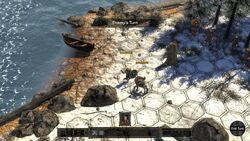RPG Codex Retrospective Review: Darklands
RPG Codex Retrospective Review: Darklands
Review - posted by Crooked Bee on Sat 24 August 2013, 14:59:47
Tags: Arnold Hendrick; Darklands; MicroProseYou know that last year we did a retrospective interview on Darklands, open-world RPG designed by Arnold Hendrick and released by Microprose by 1992. If that didn't convince you to give the game a try, perhaps this review by Darth Roxor might. Have a snippet:
Read the full article: RPG Codex Retrospective Review: Darklands
Good ol’ Darklands. In the Academagia review I did for the Codex, I wrote that I wished it had just been a gigantic text adventure. I have reconsidered that opinion a bit since then, because while that might be an improvement for a game like Academagia, I believe that kind of thing would make Darklands a much less “full” experience. While rather awful mechanically, the combat engine still serves its purpose; improving and not removing it would be the best course of action.
Everything else, however, stays the same. Microprose gave us an absolute classic that should be checked out by every self-respecting RPG enthusiast out there, especially those who favour simulation above all else. It also makes an excellent treat for those who have a big love for history. Not to mention that the game is simply a gift that keeps on giving because just about everything in it is procedurally generated, so no two playthroughs are the same, and you’re bound to stumble upon something new each time you press “create a new world”.
Everything else, however, stays the same. Microprose gave us an absolute classic that should be checked out by every self-respecting RPG enthusiast out there, especially those who favour simulation above all else. It also makes an excellent treat for those who have a big love for history. Not to mention that the game is simply a gift that keeps on giving because just about everything in it is procedurally generated, so no two playthroughs are the same, and you’re bound to stumble upon something new each time you press “create a new world”.
Read the full article: RPG Codex Retrospective Review: Darklands
[Written by Darth Roxor, edited by Infinitron]
Wohin gehen Sie, mein Herr?
1992 was a pretty cool year. Quite a few classics were released back then in various gaming genres, including Wolfenstein 3D, Ultima VII and Mortal Kombat. Oh, and let us not forget Ecco The Dolphin, too.
But there was also one RPG that I believe was truly ahead of its time, and was never quite matched in some respects. It's also quite heavily overlooked nowadays, which in my opinion is downright scandalous. Considering that Josh Sawyer seems to be all the rage on the Codex these days and this game is one of his favourites, I decided that it was time to write a few words about it. The game in question was released by Microprose and its name is Darklands.
Ich hatt’ einen Kameraden
Set in the year of our Lord 1400 in the Holy Roman Empire, Darklands had a lot of things going for it. It had “sandbox” gameplay before that became a buzzword, where the main goal was simply to travel around the land and become rich and famous, with plenty of randomly generated quests and encounters, and an incredibly well-researched historical setting with a twist – the game's intent was to show medieval Germany as it was seen through the eyes of its contemporaries, including supernatural elements from Germanic folklore, miraculous works of saints and much more.
The fun begins immediately during character creation. You create a party of four adventurers, and not only do you get to regulate their attributes and skills, but you also define the life they led before they started adventuring. Each character can choose from a variety of backgrounds, from noble heir to rural commoner, which will influence their statistics in various ways. A nobleman will start with an edge in reading and writing, while a city trader will have higher streetwise. The background also determines the occupations available to your character during childhood, which, again, switches the numbers around in skills. A freshly-created adventurer is 20 years old, but you can choose to draw out his career over more years, each extension giving more skill points, and aging the character by 5 years. Again, the backgrounds and last taken occupation influence what can be undertaken afterwards, but you also need to be careful, as once the character reaches 30 years of age, his attributes will start deteriorating. Apart from all that you also get to distribute 99 experience points that can be allocated to attributes and skills (max skill increase with xp is determined by background and occupation).
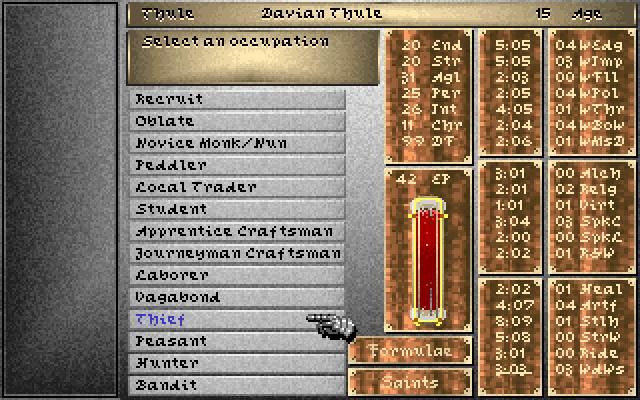
The character generation is robust and fun, and allows for some lots of min-maxing and replayability. Do you set out with a bunch of 20-years-old freshmen, or risk taking veterans, knowing that they will have an easier start with more skills, but will actually get weaker along the course of the game? This can be a pretty big gamble if you plan to play for a long time, considering that you barely ever get the chance to raise attributes, while skills increase with use or study.
While on the subject of raising skills, there is one thing that is particularly bothersome. Some of them are preposterously hard to improve. Weapon skills, for example, keep going up like crazy, and it’s not hard to get from 20 to 70 in a very short time. Stuff like healing or religious rites, on the other hand, can only be increased by paying for daily training, and the chance for them to increase is completely random, meaning that you can waste ten days worth of time and money and not get a single point of improvement. And then you have other stuff like stealth or horseback riding, which can’t be trained at all, and only have a chance of increasing through use during adventures, which don't pop up all that often, either.
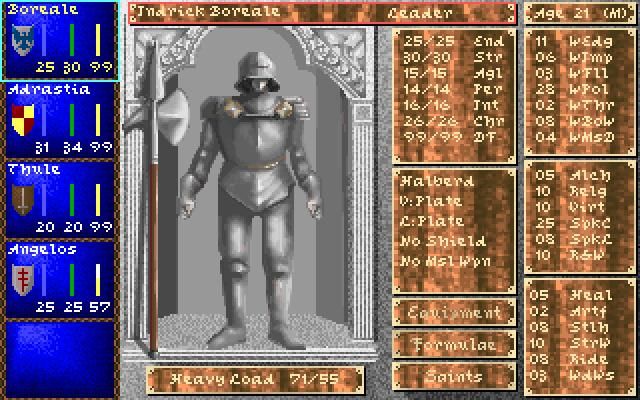
Die Wanderjahre
Now that you have your motley crew, it’s time to set off to the road and earn some fame and riches™. And ho boy, there are many, many possibilities for making that happen.
Generally speaking, the gameplay of Darklands operates on three different “planes” – the overland travel map, text adventures reserved for specific encounters and an isometric dungeoneering/combat mode.
When travelling from city to city, your party gets placed on an overland map of medieval Germany. Travel speed is dependent on a few factors, such as whether your party has horses (and how high their quality is) and the type of terrain you are moving through. Roads are the fastest form of travel, but obviously they don’t lead everywhere, and sometimes you will need to make a detour through forests, swamps, etc, which all slow your party down. There are also some impassable objects like deep waters and mountains, unless you pray to a saint for miraculous guidance (everyone can be Jesus and walk on water! Thanks, Saint Florian). The map also changes along with the seasons, and it is not uncommon to run into a particularly nasty blizzard when travelling in winter.

The overland map is also the primary place where you run into trouble. No place is safe. Bandits prowl throughout the land, greedy bishops and evil alchemists scout the roads in search of easy pickings, and the wild hunt can descend on unwary travellers from the night sky. Even seemingly peaceful sites may hide dark secrets – castle lords are petty and brutal, small hamlets more often than not perform satanic rituals, even holy monasteries are not exempt from the allure of the devil and may stray from the light of Christ. The game’s motto is “in medieval Germany, reality is more horrifying than fantasy”, and it shows. If your party is not travelling at full strength, you are basically asking to get horribly violated by whatever horrors lie around every corner. Sometimes even veterans can run into events above their skill level.
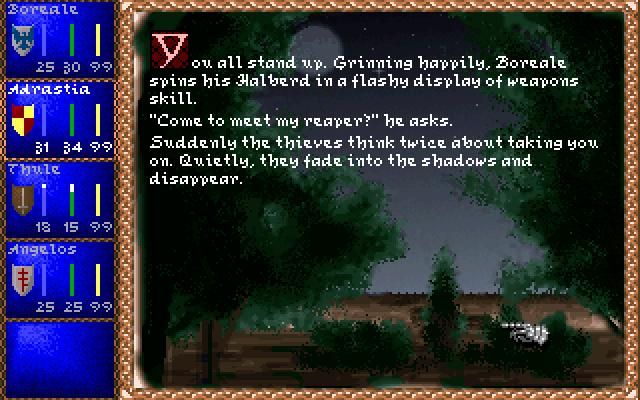
All of these events are presented in a neat text adventure interface. You are given a description of the situation, along with some cool artwork and a few options to choose from to resolve the problem. This is without a doubt Darklands’s biggest strength. The text adventures are all well-written, and usually present an absolute truckload of choices – the amount of skill checks and different approaches in this game is simply outstanding. Just about every encounter presents at least two or three skill checks, a surrender option, begging a saint for help or using alchemy to gain the upper hand. And the best thing is that these options often don’t have just binary outcomes, but various degrees of success and failure. Even failing in combat does not necessarily mean “game over” in many cases – your heroes will get beaten up and stripped of all their belongings, but they’ll live.
Cities follow the same text-adventure structure, and there’s also much to do in them. They all have different shops where you can stock up on supplies, offices of various guilds and banking families, such as the Fugger, the Medici and the Hanseatic League, where you can get quests depending on your reputation, churches where you can pray and receive education, etc. You can also perform duties for the authorities, but you must first be granted audience to the burgomeisters and princes... and you can bet your ass that the clerks won’t be helpful at all. Oh, and there are also robbers. They hide in just about every side street and wait for you to stumble into a wrong alley. The cool thing about the cities is that they also change at nighttime – pretty much all shops and offices close doors, which makes them ripe pickings for some Spec Ops. All of those fat banking families can be raided at night and their riches plundered, but you must be careful not to walk into the city watch, as all cities impose curfews at night, and violating the curfew means you gotta pay the man. Or kill him dead. But as you keep getting caught, your local reputation decreases, which may start problems – people will refuse to trade with you, churches will close their doors before your devilry, and even getting out of a city might become problematic if you are wanted!
Once it’s time to draw your weapons and beat some sense into a bunch of thugs, or when you delve into areas inhabited by enemies, like castles and caves, the game switches to the isometric battle view. And this is when things get a little sucky because the combat system is kind of shit.
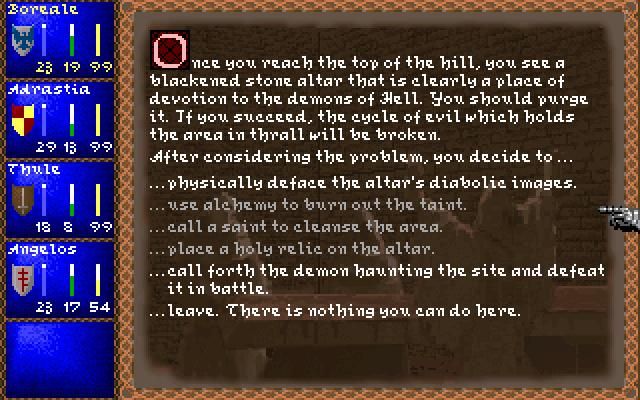
While most RPGs of the era were still clinging to the past because of technological limitations through the use of turn-based combat, Darklands went one step ahead and introduced an Innovative Real-Time With Pause™ system. During battle, you can control each of your dudes separately, pause the action with the spacebar and issue orders. Your characters have a pretty good array of combat stances that influence theirstats – parrying will do less damage but significantly up the defence, seeking vulnerable places in an enemy’s defence will increase armour penetration, but decrease attack speed, etc. Characters in combat with each other are basically locked out of all actions, they can only flee or change stance – no target switching, no special moves, whatever. This makes the combat system a target for abuse to hell and back – usually the best strategy is to send in one heavy-armoured dude to parry the enemy while the rest of the party goes berserk on his ass. In the event of many enemies, find a chokepoint where they can come one-by-one, while you beat the crap out of them with everyone. If no chokepoints are present, send heavy hitters ahead to dispose of mooks, while the vulnerable characters keep kiting around the rest.
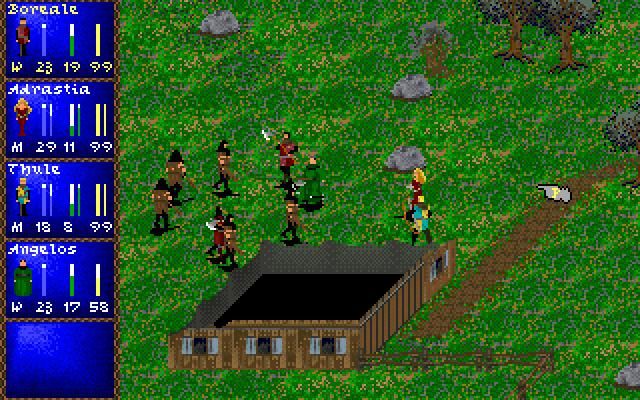
The saddest thing is that the combat system actually provides a lot of cool tools and variables, but most of them are lost in the broken clusterfuck that fights usually spiral into. The characters have two “health” bars – endurance and strength. Strength is your character’s life force – as it goes down, his combat abilities go down too. At 0, he’s dead, and there’s no resurrection. Only hits that penetrate armour can damage strength. What doesn’t penetrate hits only endurance, which regenerates pretty fast out of combat, and only KOs the character when down to 0. There's also a huge array of melee weapons that all have different statistics (skill requirements, damage, armour penetration, speed), and the same with ranged weapons, that vary from throwing knives to brass handguns, but usually don’t get fired more than 5 times during a fight (and that's in extreme situations). There are also different sets of armour with various pros and cons, alchemical concoctions, etc. But all of these things matter very little, when the ‘optimal’ course of action is to get one meatshield and three berserkers. Alternatively, you can put a spare suit of plate armour in each character's backpack (because only things you equip have weight, so you can carry 30 suits of armour on your back with no problems) and get 4 meatshields when the situation calls for it. The bad combat that, I believe, could easily be fixed by containing the chaos and exploits with a turn-based engine, is very much the sole thing that keeps Darklands from achieving true perfection.
The dungeon-delving part of the game is also fairly ugly. The environments you go through are usually uninteresting, and except for going through mobs of enemies there’s not much to do in them. Sure, they often have some hidden traps and random encounters or chests with goodies, but it’s simply not enough, although you do occasionally stumble upon neat text adventure puzzles that require some deeper thinking to solve. The character movement speed is also atrociously slow, and I can only thank the heavens that I played this game for the first time fairly recently with the advent of Dosbox because I can’t imagine how painful it must have been to crawl like this without the Alt+F12 turbo mode. The dungeons can also get pretty tough because you can’t save the game while going through them. It’s only possible to save when you encounter something that invokes a text adventure.
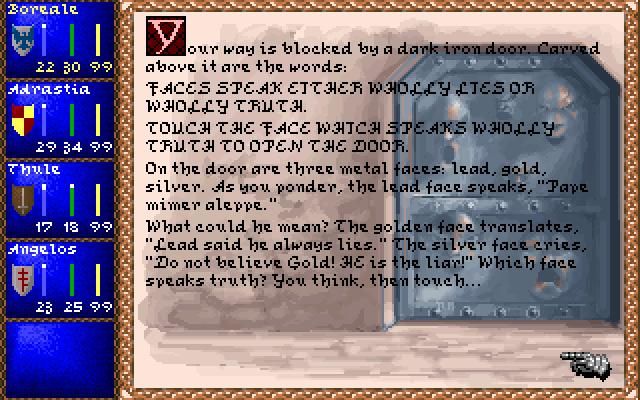
But credit has to be given where it’s due, and if you are not careful or find yourself against bad odds, the combat can get REALLY brutal. In the proud tradition of games long gone, it has a very nasty way of capitalising on every mistake you make, and taking you further down along the road to hell. Except for some rare and expensive potions, there is no way heal inside dungeons, and considering that some of them can go 5 levels deep with many branches, each strength hit against your characters counts. This can get even worse when you pop traps or come across alchemists and supernatural creatures that can use hellfire and alchemical grenades to damage your equipment (and eventually dissolve it into scrap). On top of that, leaving a dungeon in the middle of a job usually means failing the quest associated with it, so you'd better go in well-prepared, son.
I’ll mention one last thing in this chapter that I thought was also done well - the overall story arc. Like I said before, from the get-go you don’t really have any goal other than “get famous or die trying”. But as you keep playing, you keep coming across related events out of which a “big” plot will emerge, and will send you into all corners of the land to combat the forces of Satan, including the dreaded heretical Knights Templar.
Unter dem Doppeladler
There is one aspect of Darklands that makes it truly stand out in the entire history of video gaming - the sheer amount of research that must have been put into its development is simply unmatched. I would say that there hasn’t been a single other game that has as much as scratched the surface of Darklands’s historical accuracy and setting.
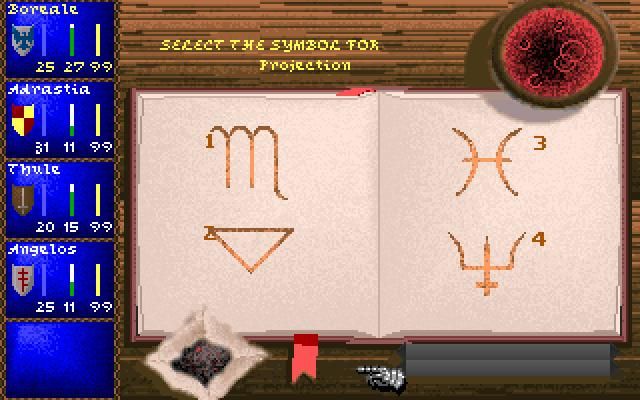
Not only is the whole map of the Holy Roman Empire accurate, from Nancy in the west to Thorn in the east, but also the towns themselves have actual historical buildings and places inside, like the names of churches, market squares and fortresses. Now add to that the fact that there are some fifty towns and cities in the game, and many of them have different names today, and your head might just explode. Even the generally inconsequential lone castles you find on the road are actual real ones. It also goes as far as implementing the medieval currency of Pfennigs, Groschen and Florins, as well as dividing the day with the monastic clock’s 3-hour “bells”, with appropriate names.
And that’s just the tip of the iceberg. There is also a list of 136 medieval saints, each with a brief characterisation, attributes and miracles. Not enough? How about a whole gamut of alchemical components such as aqua regia and marsh vapor? The constant references to German vocabulary, such as Raubritter, Vogt or Schrat? The reconstructions of Germanic folklore and the worldviews of the medieval Germans, including but not limited to kobold “knockers” (fairies living underground and helping or pestering miners), the obviously overblown satanic rituals that you hear about from simpletons even today, the self-righteous friars and bishops who curse you if they are not paid... and the list goes on. The levels of immersion provided by Darklands are simply unparalleled, and you'll become sad when you realise that it failed to set a trend after it was released.
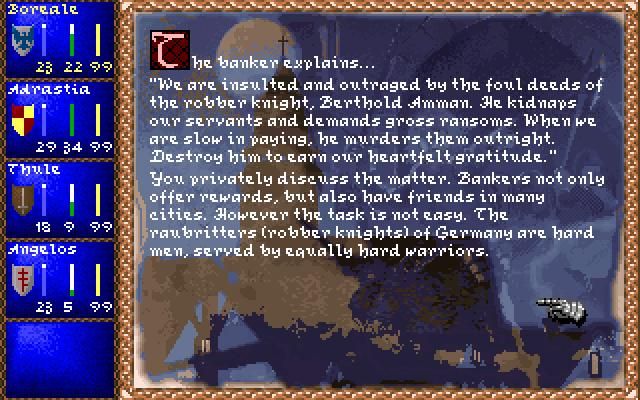
Also, while on the subject of saints, it is really cool how they tie into the gameplay. A saint first has to be discovered by studying in a monastery’s library. Your characters have a divine favour “currency” that can be spent to pray for a saint’s aid, and it regenerates itself at a steady rate, which can also be sped up by praying and donating to churches. Each saint has a set of attributes and special abilities that may be activated when the saint is invoked. For example, Saint Emydius will increase the party’s Charisma and Speak Common skills, and may also be invoked in certain contextual situations to destroy sites of satanic cult. To invoke a saint properly, a sufficient virtue skill requirement must be reached as well, and it’s necessary to keep tabs on a saint’s patron day – the further away in time you are, the harder will it be to get divine aid. Also, holy assistance can sometimes be a double-edged sword – other individuals may rarely call upon it as well. It doesn’t happen often, but when it does, it’s so unexpected that it hits you harder than a hammer. Not to mention how genuinely funny it feels to be “out-prayed” – one example I remember was when I was storming the castle of a local lord. The moment I got to his chambers, he raised a crucifix and invoked Saint Genevieve, who can prevent fights, which paralysed my party and made them leave the castle in peace.
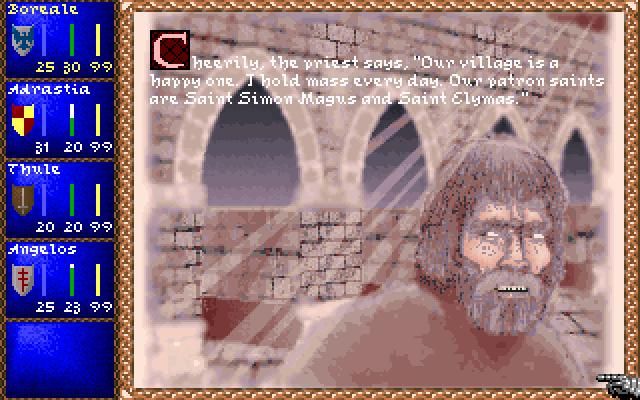
Oh, and did I mention that even the game’s goddamn soundtrack is based off of various medieval tunes, like church chants and lute melodies? It’s pretty great and definitely keeps the atmosphere up. Just a shame that it goes completely silent when you enter dungeons.
Götterdämmerung
Good ol’ Darklands. In the Academagia review I did for the Codex, I wrote that I wished it had just been a gigantic text adventure. I have reconsidered that opinion a bit since then, because while that might be an improvement for a game like Academagia, I believe that kind of thing would make Darklands a much less “full” experience. While rather awful mechanically, the combat engine still serves its purpose; improving and not removing it would be the best course of action.
Everything else, however, stays the same. Microprose gave us an absolute classic that should be checked out by every self-respecting RPG enthusiast out there, especially those who favour simulation above all else. It also makes an excellent treat for those who have a big love for history. Not to mention that the game is simply a gift that keeps on giving because just about everything in it is procedurally generated, so no two playthroughs are the same, and you’re bound to stumble upon something new each time you press “create a new world”.
We also did an interview with Darklands designer Arnold Hendrick last year, which you might want to check out: http://www.rpgcodex.net/content.php?id=8246
Wohin gehen Sie, mein Herr?
1992 was a pretty cool year. Quite a few classics were released back then in various gaming genres, including Wolfenstein 3D, Ultima VII and Mortal Kombat. Oh, and let us not forget Ecco The Dolphin, too.
But there was also one RPG that I believe was truly ahead of its time, and was never quite matched in some respects. It's also quite heavily overlooked nowadays, which in my opinion is downright scandalous. Considering that Josh Sawyer seems to be all the rage on the Codex these days and this game is one of his favourites, I decided that it was time to write a few words about it. The game in question was released by Microprose and its name is Darklands.
Ich hatt’ einen Kameraden
Set in the year of our Lord 1400 in the Holy Roman Empire, Darklands had a lot of things going for it. It had “sandbox” gameplay before that became a buzzword, where the main goal was simply to travel around the land and become rich and famous, with plenty of randomly generated quests and encounters, and an incredibly well-researched historical setting with a twist – the game's intent was to show medieval Germany as it was seen through the eyes of its contemporaries, including supernatural elements from Germanic folklore, miraculous works of saints and much more.
The fun begins immediately during character creation. You create a party of four adventurers, and not only do you get to regulate their attributes and skills, but you also define the life they led before they started adventuring. Each character can choose from a variety of backgrounds, from noble heir to rural commoner, which will influence their statistics in various ways. A nobleman will start with an edge in reading and writing, while a city trader will have higher streetwise. The background also determines the occupations available to your character during childhood, which, again, switches the numbers around in skills. A freshly-created adventurer is 20 years old, but you can choose to draw out his career over more years, each extension giving more skill points, and aging the character by 5 years. Again, the backgrounds and last taken occupation influence what can be undertaken afterwards, but you also need to be careful, as once the character reaches 30 years of age, his attributes will start deteriorating. Apart from all that you also get to distribute 99 experience points that can be allocated to attributes and skills (max skill increase with xp is determined by background and occupation).

The character generation is robust and fun, and allows for some lots of min-maxing and replayability. Do you set out with a bunch of 20-years-old freshmen, or risk taking veterans, knowing that they will have an easier start with more skills, but will actually get weaker along the course of the game? This can be a pretty big gamble if you plan to play for a long time, considering that you barely ever get the chance to raise attributes, while skills increase with use or study.
While on the subject of raising skills, there is one thing that is particularly bothersome. Some of them are preposterously hard to improve. Weapon skills, for example, keep going up like crazy, and it’s not hard to get from 20 to 70 in a very short time. Stuff like healing or religious rites, on the other hand, can only be increased by paying for daily training, and the chance for them to increase is completely random, meaning that you can waste ten days worth of time and money and not get a single point of improvement. And then you have other stuff like stealth or horseback riding, which can’t be trained at all, and only have a chance of increasing through use during adventures, which don't pop up all that often, either.

Die Wanderjahre
Now that you have your motley crew, it’s time to set off to the road and earn some fame and riches™. And ho boy, there are many, many possibilities for making that happen.
Generally speaking, the gameplay of Darklands operates on three different “planes” – the overland travel map, text adventures reserved for specific encounters and an isometric dungeoneering/combat mode.
When travelling from city to city, your party gets placed on an overland map of medieval Germany. Travel speed is dependent on a few factors, such as whether your party has horses (and how high their quality is) and the type of terrain you are moving through. Roads are the fastest form of travel, but obviously they don’t lead everywhere, and sometimes you will need to make a detour through forests, swamps, etc, which all slow your party down. There are also some impassable objects like deep waters and mountains, unless you pray to a saint for miraculous guidance (everyone can be Jesus and walk on water! Thanks, Saint Florian). The map also changes along with the seasons, and it is not uncommon to run into a particularly nasty blizzard when travelling in winter.

The overland map is also the primary place where you run into trouble. No place is safe. Bandits prowl throughout the land, greedy bishops and evil alchemists scout the roads in search of easy pickings, and the wild hunt can descend on unwary travellers from the night sky. Even seemingly peaceful sites may hide dark secrets – castle lords are petty and brutal, small hamlets more often than not perform satanic rituals, even holy monasteries are not exempt from the allure of the devil and may stray from the light of Christ. The game’s motto is “in medieval Germany, reality is more horrifying than fantasy”, and it shows. If your party is not travelling at full strength, you are basically asking to get horribly violated by whatever horrors lie around every corner. Sometimes even veterans can run into events above their skill level.

All of these events are presented in a neat text adventure interface. You are given a description of the situation, along with some cool artwork and a few options to choose from to resolve the problem. This is without a doubt Darklands’s biggest strength. The text adventures are all well-written, and usually present an absolute truckload of choices – the amount of skill checks and different approaches in this game is simply outstanding. Just about every encounter presents at least two or three skill checks, a surrender option, begging a saint for help or using alchemy to gain the upper hand. And the best thing is that these options often don’t have just binary outcomes, but various degrees of success and failure. Even failing in combat does not necessarily mean “game over” in many cases – your heroes will get beaten up and stripped of all their belongings, but they’ll live.
Cities follow the same text-adventure structure, and there’s also much to do in them. They all have different shops where you can stock up on supplies, offices of various guilds and banking families, such as the Fugger, the Medici and the Hanseatic League, where you can get quests depending on your reputation, churches where you can pray and receive education, etc. You can also perform duties for the authorities, but you must first be granted audience to the burgomeisters and princes... and you can bet your ass that the clerks won’t be helpful at all. Oh, and there are also robbers. They hide in just about every side street and wait for you to stumble into a wrong alley. The cool thing about the cities is that they also change at nighttime – pretty much all shops and offices close doors, which makes them ripe pickings for some Spec Ops. All of those fat banking families can be raided at night and their riches plundered, but you must be careful not to walk into the city watch, as all cities impose curfews at night, and violating the curfew means you gotta pay the man. Or kill him dead. But as you keep getting caught, your local reputation decreases, which may start problems – people will refuse to trade with you, churches will close their doors before your devilry, and even getting out of a city might become problematic if you are wanted!
Once it’s time to draw your weapons and beat some sense into a bunch of thugs, or when you delve into areas inhabited by enemies, like castles and caves, the game switches to the isometric battle view. And this is when things get a little sucky because the combat system is kind of shit.

While most RPGs of the era were still clinging to the past because of technological limitations through the use of turn-based combat, Darklands went one step ahead and introduced an Innovative Real-Time With Pause™ system. During battle, you can control each of your dudes separately, pause the action with the spacebar and issue orders. Your characters have a pretty good array of combat stances that influence theirstats – parrying will do less damage but significantly up the defence, seeking vulnerable places in an enemy’s defence will increase armour penetration, but decrease attack speed, etc. Characters in combat with each other are basically locked out of all actions, they can only flee or change stance – no target switching, no special moves, whatever. This makes the combat system a target for abuse to hell and back – usually the best strategy is to send in one heavy-armoured dude to parry the enemy while the rest of the party goes berserk on his ass. In the event of many enemies, find a chokepoint where they can come one-by-one, while you beat the crap out of them with everyone. If no chokepoints are present, send heavy hitters ahead to dispose of mooks, while the vulnerable characters keep kiting around the rest.

The saddest thing is that the combat system actually provides a lot of cool tools and variables, but most of them are lost in the broken clusterfuck that fights usually spiral into. The characters have two “health” bars – endurance and strength. Strength is your character’s life force – as it goes down, his combat abilities go down too. At 0, he’s dead, and there’s no resurrection. Only hits that penetrate armour can damage strength. What doesn’t penetrate hits only endurance, which regenerates pretty fast out of combat, and only KOs the character when down to 0. There's also a huge array of melee weapons that all have different statistics (skill requirements, damage, armour penetration, speed), and the same with ranged weapons, that vary from throwing knives to brass handguns, but usually don’t get fired more than 5 times during a fight (and that's in extreme situations). There are also different sets of armour with various pros and cons, alchemical concoctions, etc. But all of these things matter very little, when the ‘optimal’ course of action is to get one meatshield and three berserkers. Alternatively, you can put a spare suit of plate armour in each character's backpack (because only things you equip have weight, so you can carry 30 suits of armour on your back with no problems) and get 4 meatshields when the situation calls for it. The bad combat that, I believe, could easily be fixed by containing the chaos and exploits with a turn-based engine, is very much the sole thing that keeps Darklands from achieving true perfection.
The dungeon-delving part of the game is also fairly ugly. The environments you go through are usually uninteresting, and except for going through mobs of enemies there’s not much to do in them. Sure, they often have some hidden traps and random encounters or chests with goodies, but it’s simply not enough, although you do occasionally stumble upon neat text adventure puzzles that require some deeper thinking to solve. The character movement speed is also atrociously slow, and I can only thank the heavens that I played this game for the first time fairly recently with the advent of Dosbox because I can’t imagine how painful it must have been to crawl like this without the Alt+F12 turbo mode. The dungeons can also get pretty tough because you can’t save the game while going through them. It’s only possible to save when you encounter something that invokes a text adventure.

But credit has to be given where it’s due, and if you are not careful or find yourself against bad odds, the combat can get REALLY brutal. In the proud tradition of games long gone, it has a very nasty way of capitalising on every mistake you make, and taking you further down along the road to hell. Except for some rare and expensive potions, there is no way heal inside dungeons, and considering that some of them can go 5 levels deep with many branches, each strength hit against your characters counts. This can get even worse when you pop traps or come across alchemists and supernatural creatures that can use hellfire and alchemical grenades to damage your equipment (and eventually dissolve it into scrap). On top of that, leaving a dungeon in the middle of a job usually means failing the quest associated with it, so you'd better go in well-prepared, son.
I’ll mention one last thing in this chapter that I thought was also done well - the overall story arc. Like I said before, from the get-go you don’t really have any goal other than “get famous or die trying”. But as you keep playing, you keep coming across related events out of which a “big” plot will emerge, and will send you into all corners of the land to combat the forces of Satan, including the dreaded heretical Knights Templar.
Unter dem Doppeladler
There is one aspect of Darklands that makes it truly stand out in the entire history of video gaming - the sheer amount of research that must have been put into its development is simply unmatched. I would say that there hasn’t been a single other game that has as much as scratched the surface of Darklands’s historical accuracy and setting.

Not only is the whole map of the Holy Roman Empire accurate, from Nancy in the west to Thorn in the east, but also the towns themselves have actual historical buildings and places inside, like the names of churches, market squares and fortresses. Now add to that the fact that there are some fifty towns and cities in the game, and many of them have different names today, and your head might just explode. Even the generally inconsequential lone castles you find on the road are actual real ones. It also goes as far as implementing the medieval currency of Pfennigs, Groschen and Florins, as well as dividing the day with the monastic clock’s 3-hour “bells”, with appropriate names.
And that’s just the tip of the iceberg. There is also a list of 136 medieval saints, each with a brief characterisation, attributes and miracles. Not enough? How about a whole gamut of alchemical components such as aqua regia and marsh vapor? The constant references to German vocabulary, such as Raubritter, Vogt or Schrat? The reconstructions of Germanic folklore and the worldviews of the medieval Germans, including but not limited to kobold “knockers” (fairies living underground and helping or pestering miners), the obviously overblown satanic rituals that you hear about from simpletons even today, the self-righteous friars and bishops who curse you if they are not paid... and the list goes on. The levels of immersion provided by Darklands are simply unparalleled, and you'll become sad when you realise that it failed to set a trend after it was released.

Also, while on the subject of saints, it is really cool how they tie into the gameplay. A saint first has to be discovered by studying in a monastery’s library. Your characters have a divine favour “currency” that can be spent to pray for a saint’s aid, and it regenerates itself at a steady rate, which can also be sped up by praying and donating to churches. Each saint has a set of attributes and special abilities that may be activated when the saint is invoked. For example, Saint Emydius will increase the party’s Charisma and Speak Common skills, and may also be invoked in certain contextual situations to destroy sites of satanic cult. To invoke a saint properly, a sufficient virtue skill requirement must be reached as well, and it’s necessary to keep tabs on a saint’s patron day – the further away in time you are, the harder will it be to get divine aid. Also, holy assistance can sometimes be a double-edged sword – other individuals may rarely call upon it as well. It doesn’t happen often, but when it does, it’s so unexpected that it hits you harder than a hammer. Not to mention how genuinely funny it feels to be “out-prayed” – one example I remember was when I was storming the castle of a local lord. The moment I got to his chambers, he raised a crucifix and invoked Saint Genevieve, who can prevent fights, which paralysed my party and made them leave the castle in peace.

Oh, and did I mention that even the game’s goddamn soundtrack is based off of various medieval tunes, like church chants and lute melodies? It’s pretty great and definitely keeps the atmosphere up. Just a shame that it goes completely silent when you enter dungeons.
Götterdämmerung
Good ol’ Darklands. In the Academagia review I did for the Codex, I wrote that I wished it had just been a gigantic text adventure. I have reconsidered that opinion a bit since then, because while that might be an improvement for a game like Academagia, I believe that kind of thing would make Darklands a much less “full” experience. While rather awful mechanically, the combat engine still serves its purpose; improving and not removing it would be the best course of action.
Everything else, however, stays the same. Microprose gave us an absolute classic that should be checked out by every self-respecting RPG enthusiast out there, especially those who favour simulation above all else. It also makes an excellent treat for those who have a big love for history. Not to mention that the game is simply a gift that keeps on giving because just about everything in it is procedurally generated, so no two playthroughs are the same, and you’re bound to stumble upon something new each time you press “create a new world”.
We also did an interview with Darklands designer Arnold Hendrick last year, which you might want to check out: http://www.rpgcodex.net/content.php?id=8246
There are 71 comments on RPG Codex Retrospective Review: Darklands











